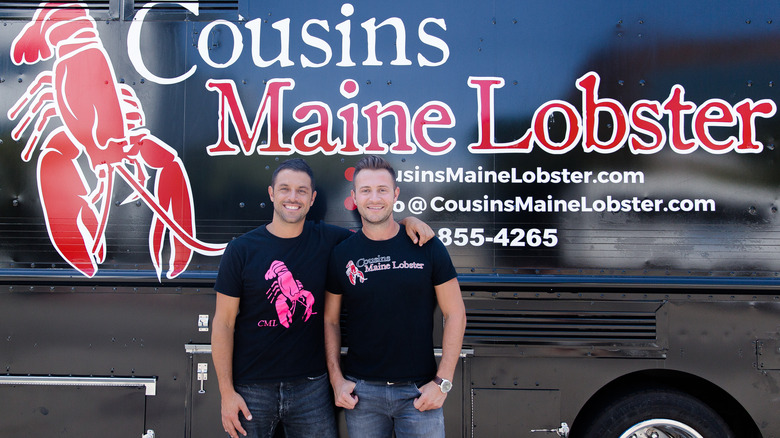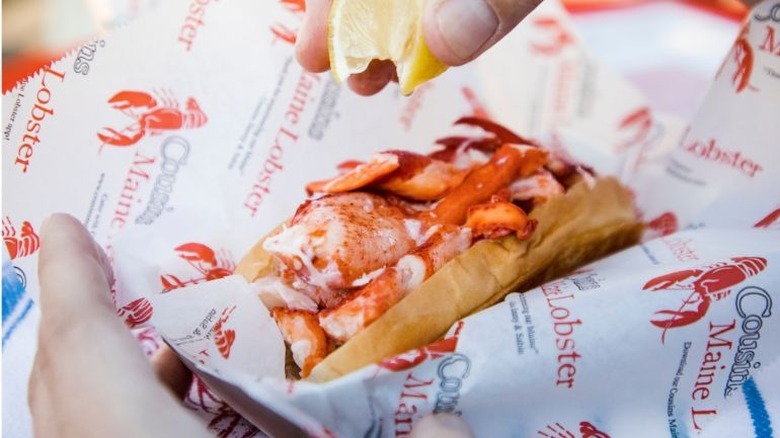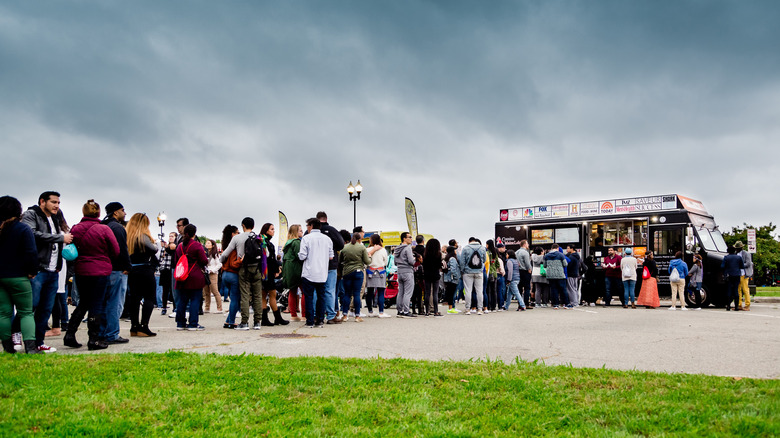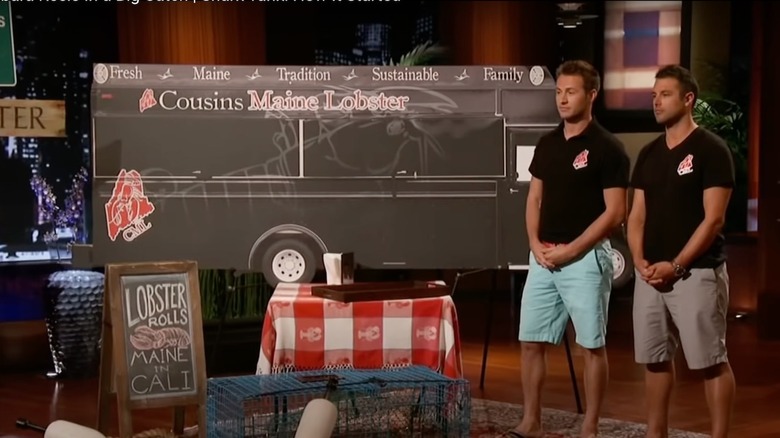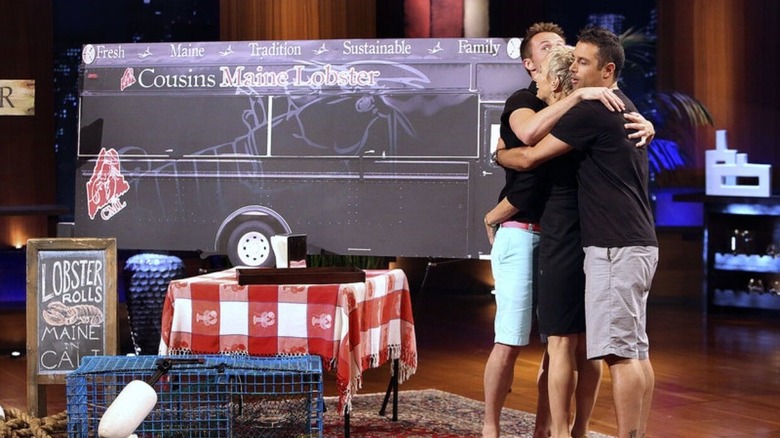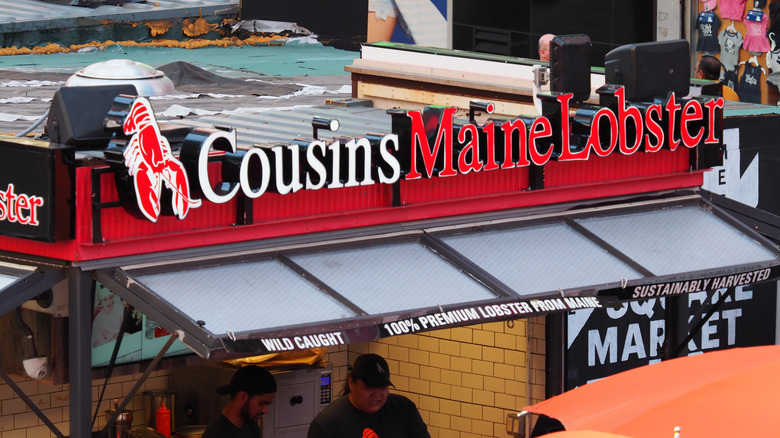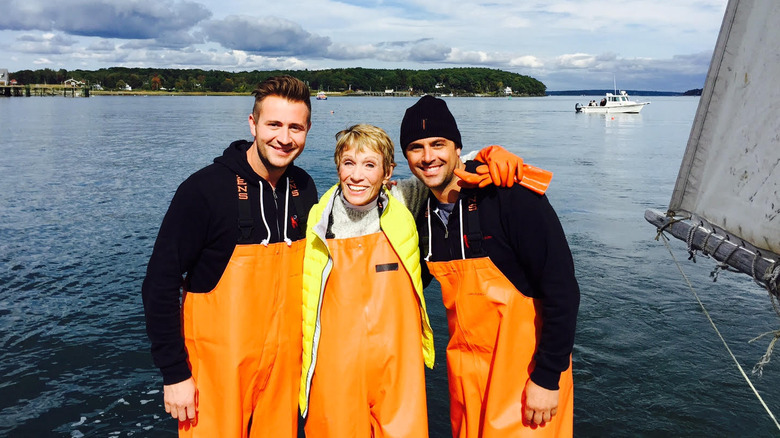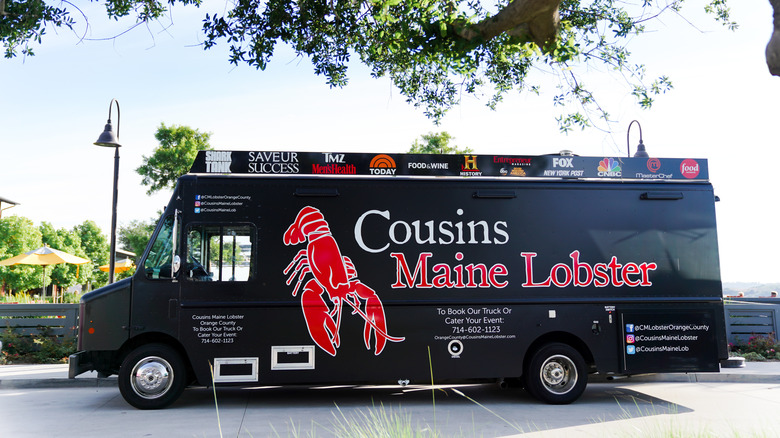Cousins Maine Lobster After Shark Tank: We Caught Up With The Founders
Can sharks and lobsters be friends? It appears they can if the "Shark Tank" episode featuring the young cofounders of Cousins Maine Lobster is any indication. More than a decade after Barbara Corcoran agreed to invest in their business, the business's single lobster truck has grown to a small empire with trucks, brick-and-mortar restaurants, and an online direct-ship business. And Corcoran has remained involved, becoming an honorary member of the family.
Real-life cousins and friends Sabin Lomac and Jim Tselikis launched their Cousins Maine Lobster food truck in 2012 as recent college graduates who hit upon the idea of bringing the lobster they grew up eating in Maine to the West Coast where Lomac lived in Los Angeles. Their business was only a couple of months old when they appeared on the show, and while the rest of the Sharks were turned off by their lack of experience and track record, Corcoran took the bait and agreed to invest. Lomac and Tselikis sat down with us for an exclusive interview to talk about the unusual way in which they prepared for their appearance, the unexpected ways their "Shark Tank" appearance has benefited their company, and their relationship with Corcoran.
Lomac and Tselikis founded the company as a tribute to their youth
The idea for a lobster business was hatched during a night of carousing on Sunset Boulevard, where Lomac and Tselikis reminisced about the delicious lobster they enjoyed at every family get-together. "You don't realize what you had when you were kids," says Lomac.
They said lobster was present at every family gathering, from weddings to birthdays, during their childhood in Maine. Both Lomac and Tselikis had worked in many restaurants and always said that if the food is great and people are kind, they want to come back. They wanted to create the sort of place that would meet those requirements. And with lobster being a rare commodity on the West Coast, selling lobster rolls seemed like a great niche.
When the idea for their lobster business still seemed a good one in the light of day, they rolled up their sleeves and got to work developing the business model, figuring out procurement and shipping, and designing the food truck. Their first truck hit the streets on April 27, 2012.
The Cousins founders were scouted to appear on 'Shark Tank'
While other "Shark Tank" competitors need to apply, sometimes multiple times, Lomac and Tselikis were approached by the show producers. A scout from the casting department was in line to try out a lobster roll the very first night the food truck launched. Sabin and Tselikis learned later that they were among 20 or so entrepreneurs who were scouted because the producers thought they'd be a good fit for an appearance on "Shark Tank."
Even though they circumvented the first cattle call, the cousins still had to go through a barrage of auditions and applications. "Our truck had only been open for a couple of weeks before we started to think about going on 'Shark Tank,'" says Lomac. The business was new and unproven but they had been strategic about setting up their business, so they felt confident they could make a good appearance.
Tselikis says he's proud of how they prepared, because they knew that being prepared was key to their success. They'd watch every episode and use index cards to write the typical questions that the Sharks would ask the candidates. They also researched all the Sharks to understand their backgrounds and motivations. While on jogs through Los Angeles, they'd practice their pitches as they ran, and they'd try to distract each other so that by the time they went on the show, they'd be unflappable.
In the episode, the Sharks seemed cranky and dismissive
The "Shark Tank" episode filmed in July 2012 and aired in October as part of Season 4. In the episode, Lomac and Tselikis, clad in logo polo shirts, shorts, and flip-flops came across as innocent and eager, and the Sharks seemed unimpressed with their lack of experience. At the time, they were only open for two months and had one truck and $150,000 in sales.
The founders were seeking $55,000 for 5% of their business, planning to use the money to buy a second truck. Kevin O'Leary seemed to question the founders' valuation of $1.1 million for their business, wondering why he couldn't just hire a couple of guys with flip flops and call a lobster supplier in Maine and do it himself. "You are very greedy crustaceans, both of you," declared O'Leary.
"You can start your own truck and hire your own staff but what you can't do is ... call up on the phone to Maine, it's not like that," countered Tselikis.
One by one the Sharks declined, though Robert Herjavec offered $55,000 for 25 percent. Finally, Corcoran, who defended the cousins when Mark Cuban said they were talking nonsense and when Herjavec bristled after being asked for business advice, made her offer. She asked for 17 percent of their business — her lucky number — before agreeing to a 15 percent stake for their requested $55,000. "Barbara, welcome to the family," said Lomac.
Cousins Maine Lobster didn't get the immediate boost they were hoping for
In addition to the LA food truck, Cousins has an e-commerce business that ships lobster online. Although they talked about that part of their business during the filming, the conversation got edited out. So orders didn't come pouring in like the cousins anticipated. Since the food truck was only in Los Angeles at the time, the truck itself enjoyed an uptick in business, but viewers in other parts of the country weren't able to try out the famed lobster rolls.
"We ended up sitting on a lot of inventory that didn't move," recalls Tselikis. Luckily, Corcoran was quick to get involved with her new partners and helped them get a spot on "Good Morning America" just a few weeks later, which gave the business the boost they were looking for.
From an emotional standpoint, the time after the show was both stressful and exhilarating, recall Tselikis and Lomac. "When you get off the set, there's a psychologist they have you meet with in the green room," reveals Tselikis. He adds that while he and his cousin were lucky enough to get a deal and have a positive experience, the psychologist would be a great benefit for those who walked away empty-handed.
The cousins both responded differently in the days after the filming. "Sabin overthinks everything, so he spent the next three days under his blanket," laughs Tselikis. "Meanwhile, I wanted to go to the bar and party!"
They didn't buy their second truck with Barbara's investment money
The founders of Cousins said on the episode that they planned to purchase a second food truck with the $55,000 investment they hoped to get. They did buy a second truck with company funds but saved Corcoran's investment to use two years later, for the legal documents and other needs to get their franchise business off the ground.
After the show, says Lomac, there was an onslaught of inquiries, people from Florida to Texas and beyond, wanting to know how they could get their product. "Barbara said, 'this is scalable, let's franchise the business,'" says Tselikis. She helped the cousins through their early years of growing pains, reinforced their confidence, and reminded them that their ideas were sound.
"When you're young entrepreneurs, you often don't believe in your ideas because of your inexperience," says Lomac. "But 12 years into the business, we're confident." The cousins think that if they hadn't appeared on "Shark Tank," they would still be a regional business and wouldn't have thought to franchise.
Corcoran is still very involved in the business
"Barbara's incredibly supportive and positive, and she's available for us 24/7," says Lomac. She was even a guest at Tselikis' wedding, and they've stayed at her home. Going into their "Shark Tank" experience, Lomac recalls being unsure how real the show actually was, and how authentic the Sharks themselves were.
"There was a certain amount of pessimism in these early years," he says. "But they're all real, and they're incredible people." Corcoran in particular seems to be a favored benefactor among "Shark Tank" competitors, including another food business, Fried Green Tomatoes, whose founders appeared on the show in 2020 and later got some valuable business advice from the Cousins Maine Lobster founders as they plotted their growth.
Many of the other Sharks also still keep tabs on Cousins Maine Lobster, despite their initial dismissiveness on the show. Daymond John showed up unannounced to be the first customer when they opened their LA restaurant. And in a follow-up segment that aired on "Shark Tank" six years after their initial appearance, several of the Sharks gathered in New York City for the grand opening of the company's 10th franchise.
What's more, the "Shark Tank" name and the backing of Corcoran has paved the way for countless media appearances, recognitions, and publicity opportunities, from being named one of the best seafood chains to hosting the Food Network TV show "Food Truck Rehab."
What's next for Cousins Maine Lobster
Today, there are 60 Cousins Maine Lobster locations in 40 cities across the United States and more are in the pipeline. Lomac and Tselikis say they are in growth mode, with plans to enter many new markets with their food trucks and restaurants. They also plan to further develop their existing footprints across the country.
One thing that won't change is the integrity of their ingredients. "We've never sacrificed the quality of our lobster," says Tselikis. "We've always paid the most and made sure it was the best and as we grew we never sacrificed that. We want people to have the same experience in year one as in year 10, and whether they're in Dallas or Pittsburg, customers would have the same eating experience."
And while they didn't see the response they wanted from that first episode, these days, whenever the episode re-airs, the business receives a bump in online orders and franchise requests. "What 'Shark Tank' did was give us a platform to speak about our business, create that energy and demand and desire to bring it to other places," says Lomac.
